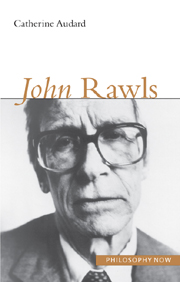Book contents
- Frontmatter
- Contents
- Acknowledgements
- Abbreviations
- Introduction
- 1 The primacy of justice
- 2 Constructing the principles of justice
- 3 Defending democratic equality: The argument from the Original Position
- 4 Pluralism and political consensus: The argument for political liberalism
- 5 A reasonable law of peoples for a real world
- Conclusion: Beyond liberalism
- Notes
- Bibliography
- Index
Conclusion: Beyond liberalism
- Frontmatter
- Contents
- Acknowledgements
- Abbreviations
- Introduction
- 1 The primacy of justice
- 2 Constructing the principles of justice
- 3 Defending democratic equality: The argument from the Original Position
- 4 Pluralism and political consensus: The argument for political liberalism
- 5 A reasonable law of peoples for a real world
- Conclusion: Beyond liberalism
- Notes
- Bibliography
- Index
Summary
To conclude, I wish to focus on the main challenges that Rawls has set himself and to assess his success in meeting them.
The first challenge was to build a convincing argument for both social justice and the protection of basic rights and liberties, which would avoid direct appeals to moral motivation, as homo oeconomicus only connects with instrumental rationality, but which would be an alternative to utilitarianism and its indirect and usually weak defence of justice.
The second challenge was to construct a conception of justice that would overcome the traditional conflicts between freedom and equality which have characterized democratic thought. How is it possible to reconcile liberalism with social democracy and economic and social rights without appealing to oppressive state power and threatening basicliberties?
The third challenge was to take proper account of the new pluralism of contemporary democratic societies, which results from the freedom of choice and the basic rights enjoyed by most members for over two hundred years. How is it possible to base a reasoned justification of justice on such a diversity of creeds and cultures? However, pluralism is also a problem at the international level and a just Society of Peoples presents the challenge of defining new forms of admission, regulation and cooperation among peoples that would respect their cultural and religious diversity. Has Rawls properly addressed the challenges of cultural and moral pluralism, which are so crucial for peace within and among nations?
Finding a new method of justification for such a context was therefore, as I have insisted, going to be the most difficult challenge for Rawls at the meta-ethical level.
- Type
- Chapter
- Information
- John Rawls , pp. 275 - 292Publisher: Acumen PublishingPrint publication year: 2006



